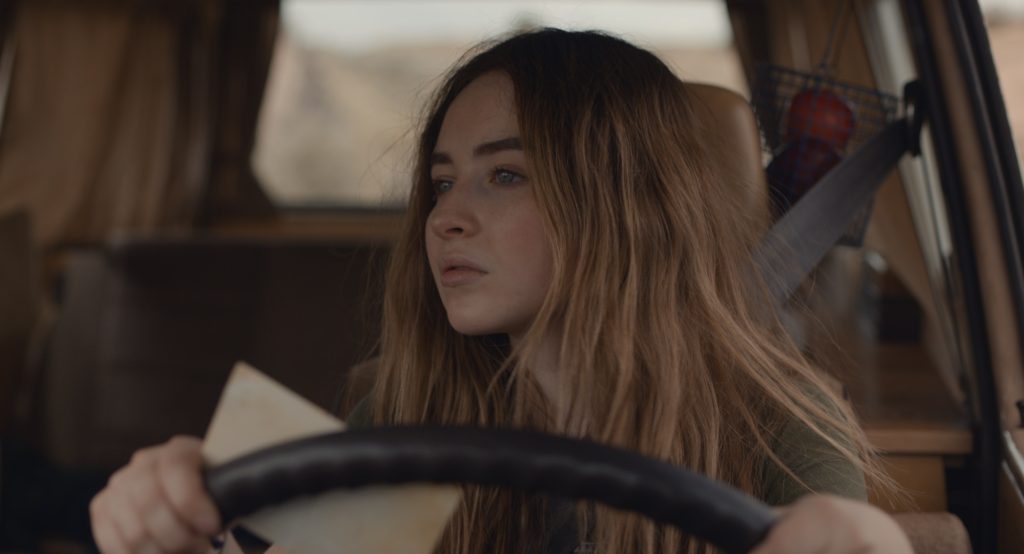Ani Simon-Kennedy is a feature film, documentary, and commercial director. Her first feature, “Days of Gray,” played at top festivals around the world with an original live score by Icelandic band Hjaltalin. She has also directed award-winning campaigns for Colgate, Smirnoff, Intel, Glamour, The New Yorker, and Vice. Her work has received support from the Sundance Institute, the Tribeca Film Institute, IFP, Film Independent, Chanel, and AT&T.
“The Short History of the Long Road” will premiere at the 2019 Tribeca Film Festival on April 27.
W&H: Describe the film for us in your own words.
AS: “The Short History of the Long Road” is about a young woman named Nola, who has only known life on the road. She’s been raised by her father Clint, the two of them against the world.
A sudden split finds her searching for her roots, leading her to work as a mechanic in New Mexico.The film explores whether family is something you are born into, or that you build for yourself.
W&H:What drew you to this story?
AS: I’ve always been drawn to road trip movies but wanted to see more female protagonists at the heart of them. I started to hatch the idea of Nola, a young nomad in America. When I learned about vandwelling, everything came together.
Nola feels most at home on the road because it’s the only lifestyle she has ever known. It is actually more of an anti-road trip movie, a story about someone used to perpetual movement who suddenly has to stand still.
W&H:What do you want people to think about when they are leaving the theater?
AS: I hope this movie inspires people to explore the road less traveled.
W&H: What was the biggest challenge in making the film?
AS: Financing! It was mind-boggling the numbers of doors we had to knock on. Even when my script had won awards, we had committed A-list cast members, and a I already had a first feature under my belt, it was very much an uphill battle.
W&H: How did you get your film funded? Share some insights into how you got the film made.
AS: My film is an amalgamation of four production companies, including my own, Bicephaly Pictures, four grants, three private investments, two in-kind donations, one loan, and one tax incentive.
W&H: What inspired you to become a filmmaker?
AS: I grew up in Paris, right in the heart of the neighborhood that has the highest concentration of art house movie theaters. Growing up, I would get my friends to act in my short films that I would shoot on the camcorder I saved up to buy with my babysitting money. Both of my parents are writers in the art world and seeing them so dedicated to their freelance life absolutely inspired my sister and me to carve our own artistic pursuits.
W&H: What’s the best and worst advice you’ve received?
AS: There’s a saying in France: “On ne change pas une équipe qui gagne.” Don’t change a winning team! When you find collaborators who get you, hold them tight. Cinematographer Cailin Yatsko has shot everything I’ve ever directed since we met in film school, and through our production company Bicephaly Pictures, we’ve made two features and over 300 shorts.
The worst advice is trusting people’s resumes over your gut instinct! It’s easy to get bowled over by impressive credits, but do your homework and get the real story to find collaborators you can trust.
W&H: What advice do you have for other female directors?
AS: It would be the same advice for directors of any gender: work off the footage you’ve got, not the script you wrote. On set, you’re creating the environment and as the magic happens, you’re catching everything while juggling approximately one million balls at the same time. Editing is your time to take a step back and clean slate your way to the actual movie.
W&H:Name your favorite woman-directed film and why.
AS: Too many to choose from! Mira Nair’s “Monsoon Wedding” is the movie that I’ve watched the most times in my life.
The first director I ever worked for was Julie Taymor, and she was hugely inspirational.
Everything Céline Sciamma makes is pure genius.
“The Short History of the Long Road” owes a debt of gratitude towards Kelly Reichardt and Rebecca Miller.
Alice Guy-Blaché paved the way for us all.
Agnès Varda, Agnès Varda, Agnès Varda, I will forever worship at your altar.
W&H: It’s been a little over a year since the reckoning in Hollywood and the global film industry began. What differences have you noticed since the #MeToo and #TimesUp movements launched?
AS: It changes everything. We will never go back. It’s a wildly exciting time to be a working filmmaker, and I can’t wait to see what happens next.







